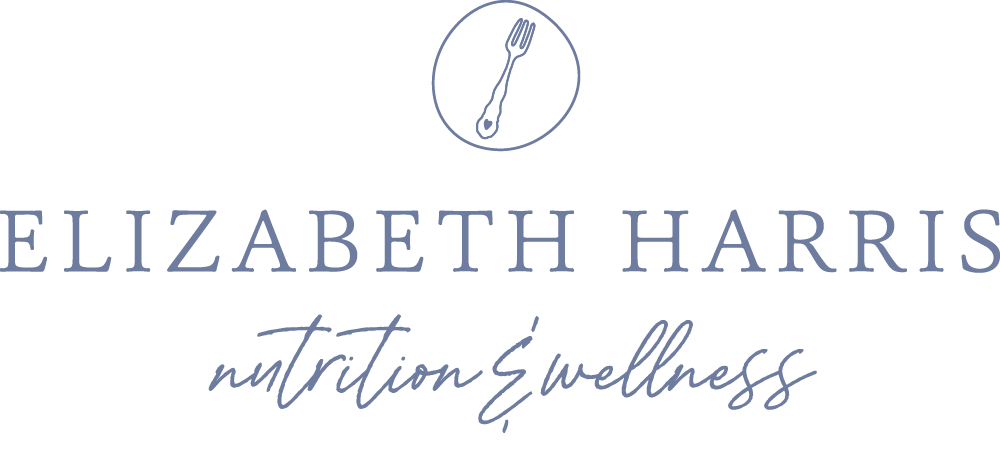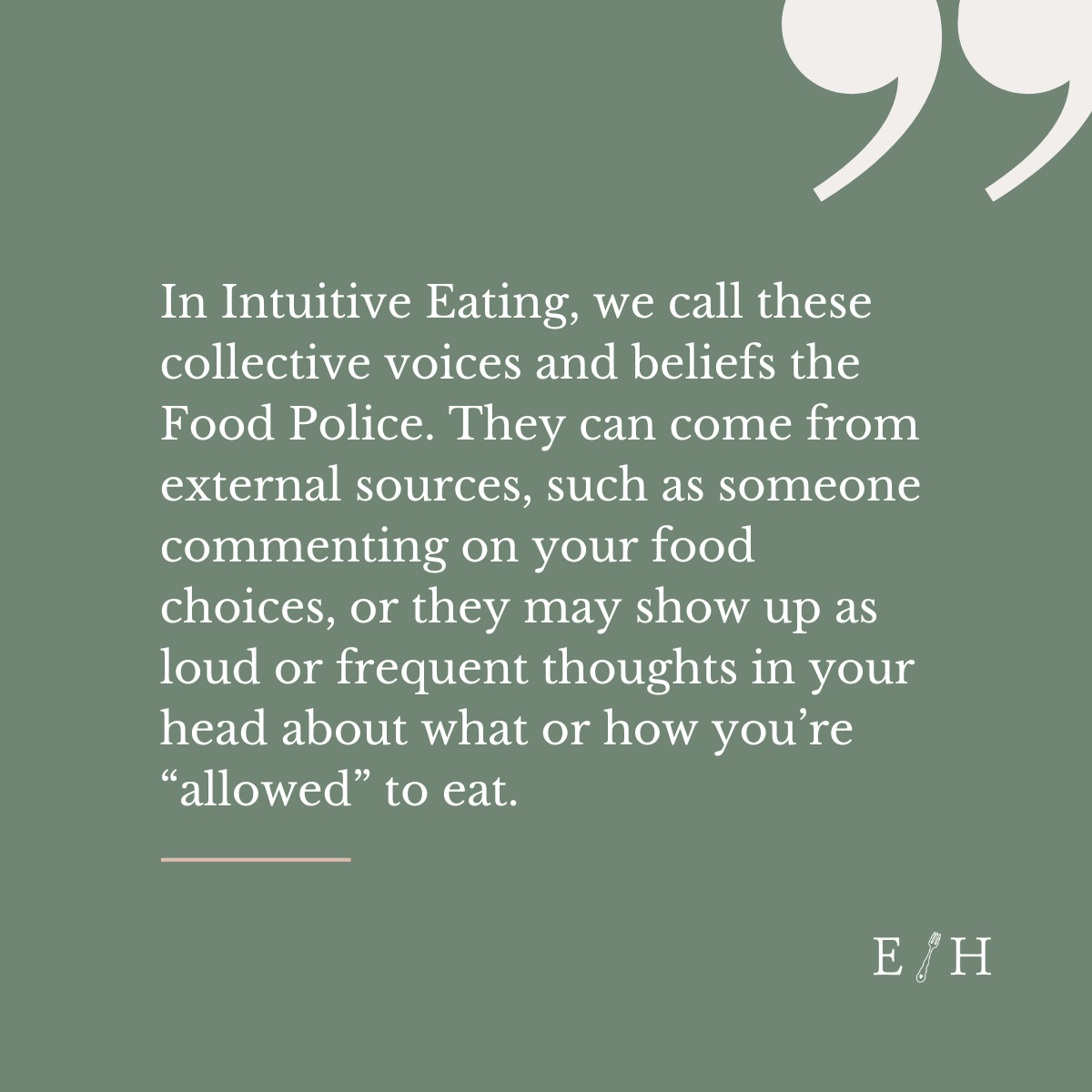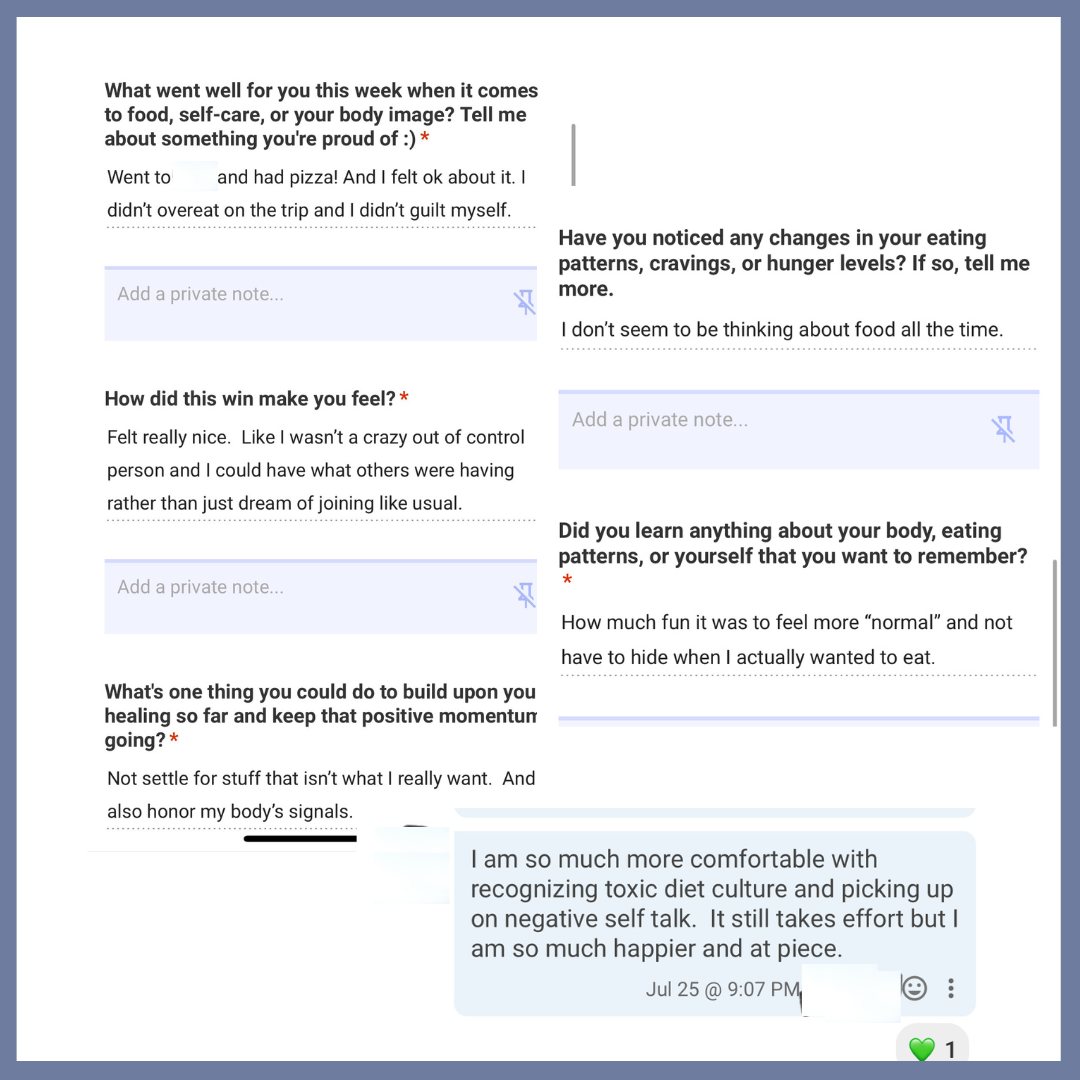Stop Feeling Guilty After Eating: How to Silence Your Inner Food Police
Have you ever wished you could eat your meals in peace, without second-guessing every food choice? Enjoy dessert or pizza without feeling guilty or worried that people may judge your choices? Are you tired of making bargains with yourself about how many bites you’re “allowed” to eat or how much time you’ll spend in the gym as penance for something you’d like to eat?
If so, you’re not alone, and I want you to know that it’s entirely possible to silence those persistent, food policing voices in your head. There’s a proven path you can follow towards peaceful, guilt-free eating.
Who Are the Food Police and How Do They Impact Your Overall Health?
Unfortunately, we live in a society that fearmongers around food and weight and even attaches moral value to what and how we’re eating. There are a lot of loud and competing voices and opinions about the “right” way to eat. Worse, the healthy eating guidance that gets the most attention is often extreme, overly rigid, or not necessarily science based.
So, while no one is born with a bunch of rules about eating, many of us collect food rules and beliefs over time that can make us feel guilty or ashamed or lead to undue eating stress. If you have a personal history of dieting or a legacy of dieting within your family, you’re likely to feel these stressors even more.
In Intuitive Eating, we call these collective voices and beliefs the Food Police. They can come from external sources, such as someone commenting on your food choices, or they may show up as loud or frequent thoughts in your head that tell you:
There’s a right and wrong way to eat
Certain foods are good, and others are bad
When and how much you’re allowed to eat
You’re more or less worthy depending on what, how, or how much you’re eating (or how your body looks)
Naturally, all this internal and external food policing can do a number on your physical, mental, and emotional health. Not only are you at increased risk of developing disordered eating or an eating disorder, but restrictive rules about eating may make it difficult to get your nutrient needs met or set you up for the restrict-binge cycle with food, where periods of undereating are followed by periods of overeating or binge eating. There are both biological and psychological reasons why this happens but suffice it to say that eating enough is a biological need and your body has developed fine-tuned mechanisms to make sure you get the food you need! Of course, guilt, stress, and shame detract from your overall emotional wellbeing too.
I point this out only to drive home the point that while we often adopt a variety of food or eating rules out of a desire to improve our health, doing so often has the exact opposite effect.
On the flip side, though, this also means there are huge, health-promoting benefits to learning how to quiet your inner food police and stop feeling guilty about your eating!
Steps to Stop Feeling Guilty After Eating
Ok, so how do you quiet those critical voices in your head? Here are some steps and key tools that can help you challenge the food police and cultivate a more compassionate and fruitful relationship with food.
Build Non-Judgmental Awareness
First, get curious. Notice what thoughts, rules, and feelings come up for you related to your eating. What situations make you feel guilty? What are your beliefs about different types of food or ways of eating? What dieting or other rules are you trying to follow at mealtimes?
Some common examples of food rules or thoughts to watch out for include:
Protein is the best macronutrient
I can’t eat before X:00 in the morning or after X:00 at night or I will gain weight
Foods with fat make you fat
Fruit has too much sugar or I should avoid starchy veggies
Processed foods are off limits
I should never eat anything with white flour
I can’t have more than X calories
Reality Test Your Rules and Beliefs
Your brain wants to believe what you tell it, but the truth is thoughts are not facts. Often, the things we believe to be true about food or our eating are cognitive distortions, meaning they are heavily exaggerated, catastrophized, or simply untrue. Now that you know what your food police sound like you can examine your food thoughts and rules with compassionate curiosity.
Where did you first hear a particular rule or belief? Is it true? Is it always true? Is it kind or helpful?
For example, is it universally true that white flour can never be part of a healthy diet or that anyone who eats refined flours automatically gains weight? Or can you think of people who eat plenty of bagels and muffins and live in thin bodies? Will eating any amount of white flour detract from your health? Or can you safely include some in a well-balanced diet?
If you’d like help identifying and unraveling your food rules, download a free copy of my brand-new guide, Invisible Diet: Hidden Rules You’re Following That Sabotage Your Success.
Reframe and Let Go
Now that you’ve identified your food policing thoughts and considered their validity, it’s time to begin challenging and reframing them into something gentler, neutral, or more accurate. Tame your cognitive distortions. Replace them with facts or simple statements about what happened as you work to let go of the story or meaning your brain is attaching to them.
For example, to build on the example above, hopefully you’re realizing there is room for some white flour in a health-promoting diet. Label that original thought a food policing rule and actively work to let it go. Next time your brain conjures this rule, tell yourself, “That’s the food police; they don’t serve me, and they’re not invited to this meal.” Or replace the thought with a neutral statement such as, “all foods can fit in a healthy dietary pattern.”
Remember that nutrition isn’t all or nothing; it’s contextual, individual, and most importantly gentle. “For the most part” are four very powerful words when it comes to healthy eating— the truth is what and how you eat most often matters most. To help my clients ditch eating guilt and stress, I like to remind them that some foods do a better job of nourishing our bodies and some do a better job of nourishing our souls. We need both.
Self-Compassion and Mindfulness Can Help
In my experience, self-compassion doesn’t typically come easily to people who grapple with a harsh inner food bully. But that’s exactly what makes it such a powerful tool to help you change your internal dialogue and make peace with food. To practice self-compassion, recognize you’re not alone in having a complicated relationship with food or your body; consider how you would respond to a friend or a loved one with a similar struggle, and practice turning those kind, compassionate words inward.
Mindfulness is another tool that allows you to develop a deeper connection with your body while also teaching you to simply observe the inner workings of your mind. Meditation is a compassionate practice of heart opening. It’s about observing your thoughts, letting them go with intention and precision, and continuously returning your attention to the present moment. As such, it can also help you create distance and space from your inner food bullies and help change how you relate to the guilt, shame, and other food policing thoughts.
5 Common Triggers for Your Inner Food Bully — and How to Manage Them
Let’s look at some common scenarios that may kick your food police into overdrive and explore what you can do to quiet them.
Mistrusting Your Hunger:
You feel hungry an hour or so after eating breakfast and your thoughts immediately start spiraling. You’re telling yourself you shouldn’t be hungry, chastising yourself for not having more willpower, and meanly thinking this is why you can’t lose weight or why you look the way you do.
The reframe: Remind yourself that hunger is a biological need, and your body is doing its job to support your needs and keep you alive. Non-judgmentally reflect on what you ate for breakfast. Are there any helpful tweaks you could have made to give that meal more staying power in your belly? Is there any other reason that may explain why you’re more hungry than usual?
Compassionate action step: Honor your hunger and get something to eat.
Weight Loss Conversations:
A friend or colleague is talking about their latest diet and sharing how much weight they’ve lost. You immediately start comparing your body and eating habits to theirs, chastising yourself for everything you ate yesterday, and angrily reminding yourself that this is why you no longer fit in the jeans that used to feel a bit too loose.
The reframe: Everyone’s body and health journey is unique and highly individual. Research shows that most diets fail to produce sustainable, long-term weight loss. Also, you have no way of knowing where this other person may be in the dieting cycle, what toll this diet may be taking on other areas of their life, or what will happen with either of your bodies in the future.
Compassionate action step: Choose and commit to one or two meaningful acts of self-care that can make you feel nourished, energized, and supported as you go through the rest of your day.
Eating “Unhealthy” Foods
You go out for pizza with your family and even though you promised yourself you’d only have a salad, you ate several slices of pizza and even got dessert. You’re so angry for breaking your pledge (again!) and all you can think of is how bad and fattening pizza is. Your mind is already swearing off tomorrow’s breakfast and lunch and calculating how many calories you need to burn in the gym to make up for this meal.
The reframe: There’s room for all foods, even pizza, in a health-promoting diet and you do not need to earn your food through exercise. Bodies need adequate nourishment every single day. Physically or mentally restricting what you eat often leads to rebound overeating, which is likely why trying to forbid yourself from eating pizza backfired.
Compassionate action step: Practice talking and thinking about all foods in neutral terms, eliminating words like “good” or “bad” or “healthy” or “unhealthy.” Instead of swearing off foods, commit to trying to enjoy them mindfully and wholeheartedly.
Emotional Eating
Work is super stressful; you know you’re not hungry but end up self-soothing by eating way too much ice cream. Afterwards, all you can think is that you’re just making things worse with that type of eating. You tell shame yourself for not being stronger and using food as a crutch.
The reframe: Food is one way to cope with difficult emotions, and emotional eating doesn’t make you a bad person. You can work on adding tools to your self-care toolbox, so you’ll have additional ways of coping with your feelings in the future.
Compassionate action step: Place your hands on your heart and take a deep breath or wrap your arms around yourself in a gentle hug. Acknowledge that this is a difficult moment and remind yourself you deserve the same love and care you would offer a loved one going through a difficult time. If you’re able, you can try to identify what emotion you were experiencing and brainstorm additiojal ways you can practice meeting that emotional need in the future.
Dining Out
You’ve joined friends for dinner at a new restaurant and all you can think about is how unhealthy the menu is or how many calories you’ll be consuming. You’re feeling so guilty you can barely enjoy the meal or your friends; you’re dreading getting on the scale in the morning and know you’ll experience a shame storm when you do.
The reframe: Enjoying guilt-free meals with friends and family is health-promoting too. Plus, one meal or day of eating cannot make or break your health. Your weight is not a measure of your worthiness or value.
Compassionate action step: Notice your spiraling thoughts and practice stopping them with a simple statement, such as “I’m not going to be mean to myself today.” Remember that what and how you eat most often matters most and treat this meal as an important act of self-care.
Real Story: How She Quieted the Food Police and Ditched Food Guilt for Good
No matter how badly you want it, you may have trouble imagining how you’ll ever be able to eat without ‘shoulding’ all over yourself, stressing about calories, or feeling guilty. Many of my Intuitive Eating clients feel this exact same way in the beginning. So, I want to share a quick story that proves what’s possible for you too.
My client “M” came to me after decades of dieting. She had bunches of rules about what she was and wasn’t allowed to eat, and she struggled with binge eating. She was always looking for the lowest calorie version of every recipe, and she’d immediately start calculating WW points in her head whenever she looked at food. She was a pro at making “healthy” swaps, even substituting dates dusted in cocoa powder in place of her birthday cake!
By the time she found me, she was exhausted and frustrated, tired of constantly feeling either guilty or deprived. “Elizabeth,” she said, “I can’t keep doing this. I want to stop feeling guilty about food. I want to enjoy eating without second-guessing every bite I put in my mouth. I just want to feel normal and think about other things besides what I should or shouldn’t eat.”
I introduced her to my Whole Health framework for healing her relationship with food. She began taking tentative but firm steps to break up with diet culture; instead of counting WW points I taught her a simple method to build balanced meals that were both filling and satisfying. This shift not only made sure she was getting enough to eat each day, but it immediately turned the dial down some of her food-related stress.
Next, she made a list of all the food and dieting rules that popped into her head each day and took note of the situations where she experienced food guilt. We discussed those rules one by one, and I helped her sort out what was nutrition fact and what was diet culture fearmongering and misinformation. Together, we identified and unpacked the thought patterns and beliefs that triggered her eating guilt; we came up with helpful reframes for some and an action plan that enabled her to slowly let go of others.
Since she was no longer counting points or following dieting rules, I armed her with tools to get better at tuning into and trusting her hunger and fullness cues and noticing her digestion, energy levels, and more. We worked in plenty of opportunities for her to practice mindfully eating yummy foods in a way that felt good. She worked hard to show herself grace, patience, and self-compassion as she slowly rewired her thoughts around food.
Within about six months, I was regularly receiving messages from her like this:
A more peaceful relationship with food is possible for you too. By implementing the strategies above, you can quiet your inner food police and replace food guilt and stress with self-trust, steady confidence, and pleasurable eating. You can nourish your whole, mind-body health and wellbeing.
If you’d like help challenging the food police and transforming your relationship with food, I invite you to book a free whole health strategy call with me to chat about how I can support you.


